
SPEED — Senior Projects in Elon Engineering Design — is a yearlong, technical problem-solving collaboration with companies, organizations and partners.
Our B.S. in Engineering seniors work in small teams with project sponsors to solve real-world problems. Elon’s No. 1 national ranking for undergraduate teaching ensures a high quality of instructional guidance that translates into successful outcomes for our partners.
Engineering Senior Design course objective
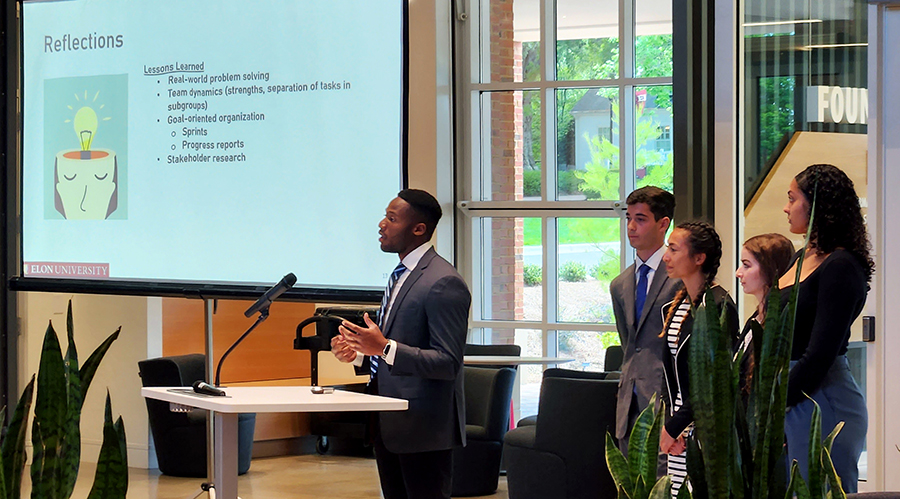 A dedicated team of senior engineering students mentored by expert faculty put ideas into action to test prototypes and develop solutions for your enterprise over an academic year. Through Scrum project management and engagement with your technical leaders, our students develop professionally while applying engineering fundamentals to real-world problems. Your partnership enables our students to graduate ready for their next engineering challenge.
A dedicated team of senior engineering students mentored by expert faculty put ideas into action to test prototypes and develop solutions for your enterprise over an academic year. Through Scrum project management and engagement with your technical leaders, our students develop professionally while applying engineering fundamentals to real-world problems. Your partnership enables our students to graduate ready for their next engineering challenge.
Partnership benefits:
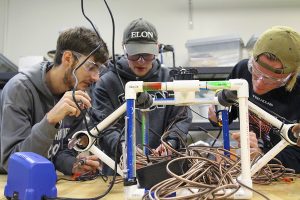 ~1,000 hours of student team problem-solving
~1,000 hours of student team problem-solving- Intellectual property ownership
- Corporate/organizational presence on campus
- Technical solutions with liberal arts and sciences creativity
- Engineering talent pipeline
- Internal leadership development opportunity
An Innovative Approach
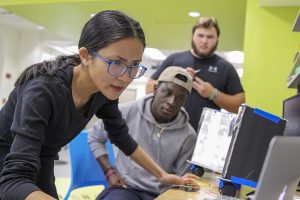 Elon Engineering builds engineering rigor on a strong foundation in the arts and sciences. We leverage experiential learning through design-and-build coursework in each academic year to develop technical problem-solving skills.
Elon Engineering builds engineering rigor on a strong foundation in the arts and sciences. We leverage experiential learning through design-and-build coursework in each academic year to develop technical problem-solving skills.
Broad Possibilities
The expertise of our faculty and the versatility of Elon’s general engineering program prepare our students to tackle challenges in mechanical, environmental, biomedical, computer, electrical and civil engineering.
Past Projects
Weir Design Water Conservation Project in the Mississippi Delta
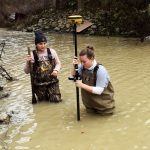 Partner: Yazoo Mississippi Delta Water Management District
Partner: Yazoo Mississippi Delta Water Management District
Overview: The Mississippi River Valley Alluvial Aquifer, which is the primary water resource to support crop irrigation in the MS Delta, has experienced long term decline in groundwater levels. The team’s designed weir and associated weir design guide for future structures will aid water conservation.
Detecting Subsurface Defects in Silicon Carbide Wafers
![]() Partner: Wolfspeed
Partner: Wolfspeed
Overview: The silicon carbide (SiC) wafer manufacturing process requires multiple steps where subsurface damage can occur resulting in product defects. This team tested two optical inspection methods, Optical Coherence Tomography (OCT) and Photoluminescence (PL), to detect subsurface defects in wafers.
Integrating Virtual Reality with an On-floor Forceplate for Balance Assessment
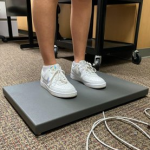 Partner: Dr. Matt Wittstein and the Department of Exercise Science
Partner: Dr. Matt Wittstein and the Department of Exercise Science
Overview: Postural control analysis is used in modern clinical settings to assess coordination, proprioception, and vestibular system function. Access to the equipment to perform this analysis is limited due to factors including cost, size, and location. This team integrated an on-floor force plate with virtual reality (VR) technology to provide an inexpensive and accessible option for exercise science research.
Development of Affordable Gas Sensors for Monitoring Constructed Wetlands
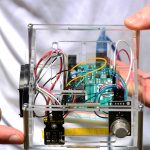
Partner: Meier Family Gift for Clean Water Research
Overview: Students designed and programmed gas sensors to detect greenhouse gases (methane, nitrogen and carbon dioxide) released from plants on constructed floating wetlands. The sensors are able to be replicated far below the cost of commercially available devices.
Contacts
For more information about the SPEED program, partnership or a potential project, please contact: